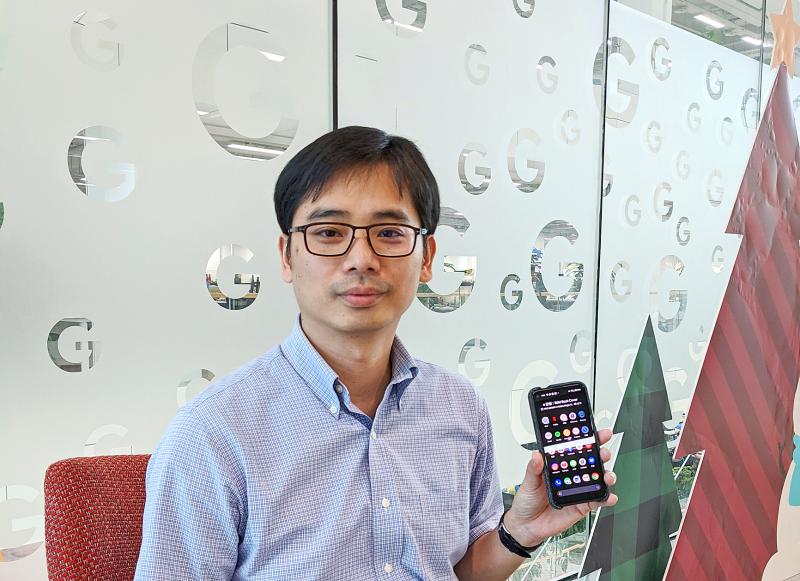Google is planning to pour more funds into its hardware development team in Taiwan to seek a bigger market share for its line of Pixel smartphones in the competitive global market.
In a recent interview with the Central News Agency, Google vice president of hardware Elmer Peng (彭昱鈞) said that although Pixel models account for only a small fraction of the global smartphone market, Google is determined to strengthen its handset operations in Taiwan to roll out better products to attract more consumers.
In 2018, Google spent US$1.1 billion to acquire HTC Corp’s (宏達電) cellphone original design manufacturing assets, which had rolled out the Pixel line for the US client.

Photo courtesy of Google
HTC also transferred 2,000 engineers to work for the US tech giant and as a result, the team has continued to work on the Pixel for Google.
Peng, who was one of the engineers transferred to work for Google, used to be a vice president at HTC, responsible for developing a wide range of technologies such as audio and image applications.
At Google, he shoulders the responsibility of Pixel development.
The Pixel models represent Google’s own interpretation of an Android phone, which is able to integrate all of the services Google can provide, Peng said.
While the Taiwanese team is in charge of developing the Pixel, Google is a multinational company and the Pixel’s development requires more cooperation with Google’s US headquarters, as well as effective and efficient international coordination with its suppliers and many others to make a better smartphone, he said.
“I am sure that Google will continue to invest in the Taiwan hardware team as talents in the team are always able to come up with good and precise product ideas, and carry out their business plans well,” Peng said.
Google has set sights on grasping a larger share in the global smartphone market by improving its Pixel line, he said.
“Although the global smartphone market has been saturated, I believe as long as Pixel is able to appeal to as many consumers as possible, Google will achieve the goal of selling more smartphones,” he added.
Citing the newly unveiled 5.81-inch Pixel 4a as an example, Peng said that the model, taking advantage of a special design in its casing weighs only 143g, which allows users to hold and use the device more easily.
Google is planning to launch its first 5G smartphone models — the Pixel 4a (5G) and Pixel 5 — later this year.
Peng said the Google phones would work well under the current 5G era.

South Korea’s equity benchmark yesterday crossed a new milestone just a month after surpassing the once-unthinkable 5,000 mark as surging global memory demand powers the country’s biggest chipmakers. The KOSPI advanced as much as 2.6 percent to a record 6,123, with Samsung Electronics Co and SK Hynix Inc each gaining more than 2 percent. With the benchmark now up 45 percent this year, South Korea’s stock market capitalization has also moved past France’s, following last month’s overtaking of Germany’s. Long overlooked by foreign funds, despite being undervalued, South Korean stocks have now emerged as clear winners in the global market. The so-called “artificial intelligence

Chinese artificial intelligence (AI) start-up DeepSeek’s (深度求索) latest AI model, set to be released as soon as next week, was trained on Nvidia Corp’s most advanced AI chip, the Blackwell, a senior official of US President Donald Trump’s administration said on Monday, in what could represent a violation of US export controls. The US believes DeepSeek will remove the technical indicators that might reveal its use of American AI chips, the official said, adding that the Blackwells are likely clustered at its data center in Inner Mongolia, an autonomous region of China. The person declined to say how the US government received

FORTUNES REVERSED: The new 15 percent levies left countries with a 10 percent tariff worse off and stripped away the advantage of those with a 15 percent rate In a swift reversal of fortunes, countries that had been hardest hit by US President Donald Trump’s tariffs have emerged as the biggest winners from the US Supreme Court’s decision to strike down his emergency levies. China, India and Brazil are among those now seeing lower tariff rates for shipments to the US after the court ruled Trump’s use of the International Emergency Economic Powers Act to impose duties was illegal. While Trump subsequently announced plans for a 15 percent global rate, Bloomberg Economics said that would mean an average effective tariff rate of about 12 percent — the lowest since

‘SEISMIC SHIFT’: The researcher forecast there would be about 1.1 billion mobile shipments this year, down from 1.26 billion the prior year and erasing years of gains The global smartphone market is expected to contract 12.9 percent this year due to the unprecedented memorychip shortage, marking “a crisis like no other,” researcher International Data Corp (IDC) said. The new forecast, a dramatic revision down from earlier estimates, gives the latest accounting of the ongoing memory crunch that is affecting every corner of the electronics industry. The demand for advanced memory to power artificial intelligence (AI) tasks has drained global supply until well into next year and jeopardizes the business model of many smartphone makers. IDC forecast about 1.1 billion mobile shipments this year, down from 1.26 billion the prior